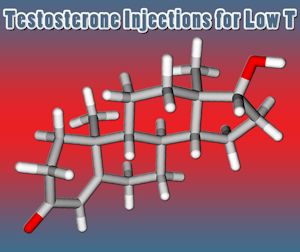 If you follow hormone or endocrinological news, it’s probable that you have heard of DHEA, one of the best “anti-aging” hormones out there.
If you follow hormone or endocrinological news, it’s probable that you have heard of DHEA, one of the best “anti-aging” hormones out there.
DHEA stands for dehydroepiandrosterone and it is a steroid hormone that is naturally produced in our bodies.
However, just like the other hormones in our bodies, DHEA can become out of balance and either be produced too much or too little by the adrenal glands.
In recent years DHEA has been sold as a “natural” supplement that can help slow aging, boost muscle growth and male vitality in general. Is it really as amazing as some people say it is?
What Exactly is DHEA?
As stated previously, DHEA is a steroid hormone that is produced in the adrenal glands. Just like testosterone and cortisol, cholesterol is its building block molecule. Small amounts are also produced in the intestines and brain.
The reason men are so interested in DHEA lately is because it is an androgen, like testosterone, but it is considered a weak androgen when compared to testosterone. In the body, most DHEA is converted into androstenedione which is the same androgen that was famously used (illegally) by Mark McGwire several years ago.
However, it can also be converted into testosterone and even estrogen, depending on the needs of the body.
 DHEA and its Anti-Aging Effects
DHEA and its Anti-Aging Effects
Anti-aging effects are the main reason that DHEA is sold on the market, mainly advertised towards men, given that it’s an androgen.
This hormone has been studied since 1934, almost 100 years, and there have been multiple scientific studies conducted on it. What we know about it in terms of aging/anti-aging is that levels peak between the ages of 20 and 30.
Production of DHEA starts when one is just a fetus, producing more than 200 mg daily. But then, levels start to decline after birth until puberty when they start to rise again. After the peak between 20 and 30, it declines by 5% a year.
In young men between 20 and 30, levels reach 10x higher than any other steroid hormone that men produce but by the age of 70, there is barely any detected in the blood.
Since DHEA declines so dramatically as men age, it definitely appears that there must be a connection between its low production and the aging symptoms we all face: weight gain, heart disease, high blood pressure, muscle loss, no strength, diabetes, etc.
Many say that DHEA supplements can stop some of these symptoms or prevent them from even happening. What does science say?
DHEA and Body Fat
A very interesting study was conducted in St. Louis by scientists at Washington University School of Medicine on 56 men and women between the ages of 65 and 78. The researchers wanted to see if DHEA could help the subjects to lose weight faster than without.
One group was given 50 mg of DHEA daily while the other group received a placebo. After six months, the DHEA group experienced abdominal fat loss, which is the worst kind of fat to have, at about 7% of their abdominal fat. They also demonstrated an improved sensitivity to insulin.
In both men and women, levels of IGF-1 and estradiol rose, whereas testosterone and PSA levels did not. A study along these lines should be replicated in order to better understand the results. However, it is promising!
 DHEA and Muscle Gains
DHEA and Muscle Gains
Many men are interested in DHEA because it is an androgen, similar to testosterone, and is even converted to testosterone in the body.
Androgens, especially testosterone, have major effects on muscle gains, strength and body composition.
The higher levels of testosterone in men are why men generally have more muscle mass and higher bone mineral density than women.
Because DHEA is an androgen, it sounds like it would have a positive effect on muscle growth, especially as one ages. Unfortunately, science does not support this claim at this time.
Two different studies, one looking at bone density and the other at muscle mass, both had results where DHEA supplementation had no effect on increasing bone mineral density or muscle mass, strength, or fat on the muscles, after 6 months to one year of supplementation. Drats!
DHEA and Heart Health
Heart disease, or more specifically, coronary artery disease (CAD), is the leading cause of death in American men. However, research looking at DHEA’s effect on CAD is contradictory as of now.
In several experiments, DHEA demonstrated that it could slow the formation of cholesterol-laden plaques in the arteries of animals who were fed high-fat diets. In a laboratory experiment, the opposite was found.
In clinical studies, more contradictions are seen. A Massachusetts Male Aging Study found a correlation between DHEA and CAD, with low DHEA levels linked to the highest risk of heart disease.
But, in a Massachusetts Women’s Health Study, the opposite was found: high DHEA levels linked to increased risk.
 We could go on with other studies looking at how DHEA affects things like depression symptoms, cognitive function, or sexual function.
We could go on with other studies looking at how DHEA affects things like depression symptoms, cognitive function, or sexual function.
However, the data is unclear at this time. Some studies say that DHEA improves adverse symptoms, while others say there is no effect. The methods of these studies need to be modified and improved in order to get more definitive answers.
For the time being, you need to decide for yourself, as well as with the consultation of your doctor or an endocrinologist such as at our clinic, if DHEA supplementation is right for you. Do your own research and weigh the pros and cons!
Contact our clinic if you have any questions regarding hormones and hormone balance, including issues with DHEA, testosterone, growth hormone, etc. Our clinic offers pharmaceutically pure DHEA as well. Just fill out our contact form or give us a call to see about purchasing high-quality DHEA supplements. Consultation is free!
Reference
Contact Us Today For A Free Consultation

- Make Sure You're in Peak Health for the Trying Times Ahead [Last Updated On: September 14th, 2024] [Originally Added On: March 8th, 2022]
Word Count: 972





















